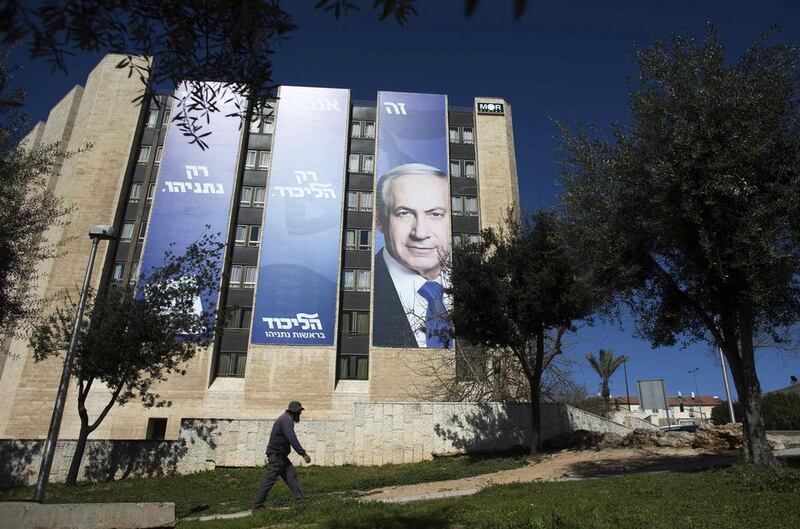Ramallah // While Israel buzzes with campaign talk and debate about its upcoming election, Palestinians in the West Bank are showing little interest in whether Benjamin Netanyahu is reelected or toppled on March 17.
After 48 years of occupation overseen by both right and left-wing governments in Israel, Palestinians are not expecting salvation to come from the Israeli ballot box – in this case from the somewhat more moderate Isaac Herzog, who is challenging Mr Netanyahu in what promises to be a close contest.
“Netanyahu goes, the other comes, what’s the difference?’’ asked Mahmoud Abboud, 45, who runs a butcher shop near bustling Manara Square.
“Will there be something new? It’s the same thing. All of them are against us. They want the land without the people.”
Across town, at the Stars Cafe in the upscale Plaza Mall, Amjad Casas, CEO of a consulting and investment service, is not optimistic either.
Between puffs of shisha, he says: “We think the players in Israel these days are not interested in peace and Palestinian rights. The political map and environment is going to the right more. I think Herzog is almost the same as Netanyahu.”
While Israelis are asking themselves whom to vote for, West Bankers face a more daunting question as the poorer, weaker party in this conflict: how to continue feeding their families and running their businesses in the face of the latest crippling Israeli economic sanction.
In early January, in response to a Palestinian bid to join the International Criminal Court, Mr Netanyahu’s government began withholding the monthly tax revenues it collects that is meant to be transferred to the Palestinian Authority.
The funds are crucial to the PA’s ability to pay its more than 155,000 employees, who have been receiving only partial salaries since then.
The cash shortage is also tearing through the economy.
“People are buying less. I give the customers credit, but the suppliers are telling me I must pay up. I’m borrowing money from my uncle so that I don’t close,” said Nasser Abdul-Qader, who owns a mini-market. He does not think a change of government in Israel will alleviate his situation. “All are bad,” he says.
As for the possibility of resuming peace talks after the election, Mr Abdul-Qader says, “The negotiations are all lies. The occupation will continue.”
While Mr Herzog says he intends to try to “reignite” negotiations, he has sharply criticised the Palestinians for applying to the ICC and recently implied that they will have to remove the threat of Israelis being prosecuted in order for headway to be made.
“We have to be candid, the situation today between Israelis and Palestinians is not on the best of terms, unfortunately it’s one of the worst periods in our relations,” he told a press conference on Febraury 24.
Mr Herzog said that as a confidence building measure, he would freeze settlement construction in the West Bank outside of major clusters of settlements – something Mr Netanyahu has refused to do – but which still falls far short of Palestinian demands for a total cessation.
The Israeli right wing is accusing Mr Herzog’s Zionist Camp list of being soft on security and ready to endanger Israel with territorial concessions in the West Bank. But Mr Herzog says he would keep the Jordan River valley in the West Bank as Israel’s eastern security border, a formulation rejected by the Palestinians in the past.
Veteran left-wing Palestinian politician Qais Abdel-Karim Samarai says: “With Herzog there could be a change in form, but no change in content.”
The official Palestinian Authority position is that the election is an internal Israeli matter. But analysts say that some Palestinian decision makers close to president Mahmoud Abbas are quietly rooting for a Herzog victory in the hope it will lead to a restart of the peace negotiations that collapsed under Mr Netanyahu.
“Abbas believes there is no other option than negotiations and that this is the only way to reach a political settlement,” explains Khalil Shaheen, research director at Masarat think tank in Ramallah.
Other decision makers, however, according to a Palestinian official who requested anonymity, believe these talks would lead nowhere while duping the international community into complying with Israel’s policies. This latter group, the official says, is hoping for a Netanyahu victory that would spur foreign countries “to wake up and realise Israel does not want peace”.
Hossam Zumlot, a senior foreign policy adviser for Mr Abbas’s Fatah movement, said that during Mr Netanyahu’s tenure, the Palestinians made advances in gaining foreign recognition for Palestinian statehood and mustering a degree of international pressure on Israel.
“With Netanyahu, our alternative has been the international track and we achieved a great deal,” Mr Zumlot said.
“The worst of the worst scenarios for us is an Israeli government that continues the status quo while conveying to the international community it has a different agenda.”
Mr Zumlot is concerned about an Israeli government that could “continue the same policies of building settlements and keeping Gaza under siege but give lip service for the international community”.
“More international pressure on Israel is inevitable but such a government could delay its momentum,” he said.
foreign.desk@thenational.ae





